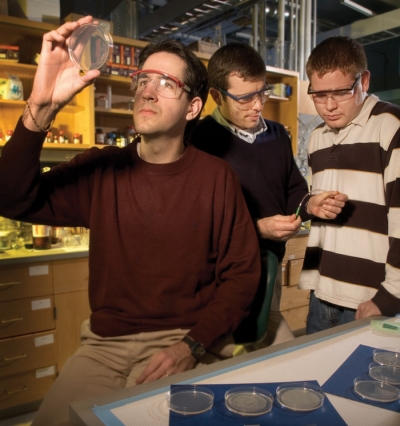Home | Beginning the Process | Prepare as an Undergraduate | Choosing a Graduate Program | Early Graduate Life | International Students
Beginning the Process
Overview
There are some common questions to consider throughout each phase of the process.
- Why are You Pursuing a Graduate Degree?
- What do You want to Contribute to the Chemical Sciences?
- What Graduate School Experiences will Benefit You?
Some questions will be answered easily, while others will take more time to explore.
Referring to a variety of resources and getting input from others will inform the process.

Pursuing a Graduate Degree
Graduate work in the chemical sciences is challenging. It requires a lively sense of curiosity, a passion for scientific inquiry, and a strong work ethic. To succeed in graduate school you must be willing to learn new things, committed to team goals and the hard work required to achieve success , and prepared to define and achieve your own goals in the context of your career plans. Depending upon your goals and the program in which you enroll, you will be making a serious commitment of at least two to five years.
As you determine whether your career pathway should include graduate school:
- Think about what you want to accomplish and what you enjoy.
- Identify specific areas of interest within the chemical sciences.
- Explore career opportunities for those with bachelor’s, master’s, and doctoral degrees.
- Review requirements for master’s and doctoral programs.
- Consider your own particular talents in relation to what is required for graduate work.
- Talk with advisers, faculty members, and friends who have had graduate experience.
- Participate in summer internships and undergraduate research projects.
Honestly assess whether you like problem solving and whether you have the requisite skills and motivation to successfully complete graduate degree
Where Can You Go with a Degree in Chemistry?
Bachelor's Degree
With a bachelor’s degree, there are many places that you can go:
- Straight into the workplace, using your technical and non-technical skills
- Professional school, pursuing degrees in fields such as medicine, allied health sciences, law, education, and business
- Graduate school, pursuing a professional science master’s, master’s, or doctoral degree in the chemical sciences
Professional Science Master's Degree (P.S.M.)
With a professional science master’s degree, you will be prepared specifically for:
- Careers in industry or government
- Various sectors, such as biotechnology or manufacturing, or areas, such as patent law or policy.
Some programs are for students who are employed full-time.
Does a P.S.M. Pay Off?
Master's Degree
With a master’s degree in chemistry, you could have a range of experiences (research, a library thesis, satisfactory completion of graduate level coursework, or a combination of all three options) that prepare you to:
- Go into the workplace, using your technical and non-technical skills
- Graduate school, pursuing a PhD in the chemical sciences
Doctoral Degree (Ph. D.)
With a doctoral degree in chemistry, you should be able to lead research projects of your own and help develop new knowledge. This prepares you to:
- Go into the workplace, using your technical and non-technical skills
- Obtain a postdoctoral position

Understanding the Chemical Sciences Landscape
Chemistry is at the center of an increasing number of related disciplines called the “Chemical Sciences”. A molecular vision of science and connections among macroscopic and microscopic properties are shaping advances:
- Across Fields
Entirely new fields, such as nanochemistry and chemical biology, and the ever increasing demand for materials with unique properties are pushing scientific and economic frontiers. - Across Sectors
Collaboration among those in academe, industry, and government is facilitating progress on more complex challenges in a dynamic employment market. - Across Borders
International teams are addressing global needs.
Considering where you might go right after graduate school and later in your career will help you identify goals, focus on experiences that develop the necessary knowledge, skills, and abilities, and make the most of your graduate studies.
Substantial and sometime rapid changes in the chemical sciences landscape make it challenging to predict your career path. During your career you will face new challenges due to the continued changes in scientific knowledge, technology, the economy, politics, and many other aspects influencing the chemical sciences landscape. Your success will depend on the development of a wide range of skills. These include technical skills, the abilities to lead, communicate, and collaborate, and above all, being recognized as a problem solver.

Understanding the World of Graduate School
Graduate programs in the chemical sciences offer doctoral and a range of master’s degrees. Specific requirements vary across graduate programs, but all will expect you to:
- Deepen Your Knowledge
You will become an expert, knowing more about a given area than your adviser. - Develop Advanced Skills
You will gain high-level technical skills such as synthesis, as well as non-technical skills such as communication. - Be Increasingly Self-Directed
You will manage yourself and your work, taking initiative, setting and meeting deadlines, and planning your next steps.
Although most graduate programs, like bachelor’s programs, involve coursework, your time in graduate school will be very different from what you experienced as an undergraduate student. Research is a primary component of doctoral and many master’s degree programs. There are also master’s programs focused on professions in which chemistry is used.
Graduate programs should broaden your horizons, providing experiences that prepare you for your career. Since their graduates pursue a range of careers in a variety of employment sectors, research-based doctoral programs focus on broadly applicable skills. Other programs, such as professional science masters programs, are focused on specific career options, often in industry.
Formal requirements and optional opportunities vary across graduate programs. The key is finding those programs with the right balance and flexibility to help you reach your goals. Consider opportunities to:
- Collaborate with other groups in academia, industry and government
- Develop an appreciation of the ethical responsibilities of a scientist
- Develop an understanding of the role of chemical sciences in addressing important societal needs
- Become familiar with entrepreneurship and intellectual property issues
Some programs are changing what their graduate students are expected and encouraged to do, responding to workforce needs, requirements of funding agencies, and a collection of reports and recommendations.
Graduate school is also a time to cultivate a network. People with whom you work and interact during graduate school can continue to provide insights, connections, advice, and support throughout your career.



